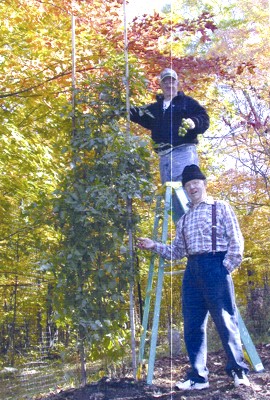 | ||
|
|
||
 |
Organic Tomatoes - L. A. Rotheraine
Tall tomato proves productive
Biodynamic Gardening
Boosts Yield
By DIANE MONTZ
Globe Staff Writer
Reprinted by permission of the
Daily Globe of Ironwood, MI
In a secluded corner of an Ironwood Township garden, an 11-foot-tall plant produced more than 300 tomatoes this season. It proved to two master gardeners that biodynamic agriculture lives up to its promise of increased plant size and yield.
Bill Lambie of Hurley grew the Selke Biodynamic Cherry Tomato from two seeds sown indoors in April. Following planting dates and a unique hilling system developed by Master Gardener L.A. Rotheraine, Lambie and Gordon Frase prepared a site for the tomato in the back of Frase's big garden.
They dug a hole two-and-one-half feet deep and filled it with layers of dirt; composted produce; chicken, cow and llama manure; and another round of the same. They dug a hole in the center of the top layer of leaf compost about a foot deep and put the plant in.
Then they watched it grow.
No standard tomato cage could support the plant. The gardeners built a custom cage from five-foot heavy duty metal mesh used in road construction.
The tomato branches filled the two-foot diameter cage, built in two sections to reach 10 feet high. The plant grew nearly two feet above the cage.
It produced two rows of tomatoes along each stem, dozens of stems of the double rows of fruit hanging from its branches.
Frase and his wife picked 229 tomatoes from the plant. Lambie stopped counting at 100.
Not only did the biodynamic soil preparation increase the harvest, it produced tomatoes with better flavor and texture, according to the gardeners.
Another tomato grower tasted the fruit of the biodynamic plant and agreed it was superior.
"They're firmer," said Lambie, a Wisconsin Master Gardener.
"It's all organic," said Frase, a Michigan Advanced Master Gardener who noted that Wisconsin offered no such advanced ranking.
"We get it right the first time," Lambie countered.
Rudolf Steiner introduced biodynamic agriculture in 1924.
L.A. Rotheraine of Bradford, Pa., adapted its ancient practices to contemporary gardening. Bios means life in Greek; dynamic means energy, according to a Rotheraine website. Bringing life-giving energy to the earth for the enhancement of plant, animal and human life is the goal of biodynamic farming and gardening.
A bumper crop of tasty tomatoes from a single plant translates the theory to the dinner table.
Frase and Lambie used no chemicals on their Selke tomato. They sprayed its leaves with Neem and Karanja oils from India, two organic pesticides.
Rotheraine developed two other biodynamic tomatoes, the RC Ratatouille and the Pear-Plum, which produces both pear and plum tomatoes on the same plant. He claims a single plant can yield more than 2,000 tomatoes using his organic hill and planting and transplanting dates.
Sheltered by trees towering overhead outside Frase's garden, the Selke tomato survived last week's killing frosts.
Next summer, Frase and Lambie plan to plant more of the biodynamic tomato plants in a different area of the garden. In full sun, they say, the harvest should be even bigger.
A plant that can feed a family and fill the freezer without the use of chemicals seems custom-made for gardens above the 46th parallel, where there can be fewer than 90 days between killing frosts.
--To learn more about L.A. Rotheraine and biodynamic gardening, visit the website rotheraine.com
Reprinted by permission of the Daily Globe of Ironwood, MI
Copyright 2005 Bliss Communication Inc. All rights reserved.
Published Wednesday, October 12, 2005 11:49:41 AM Central Time